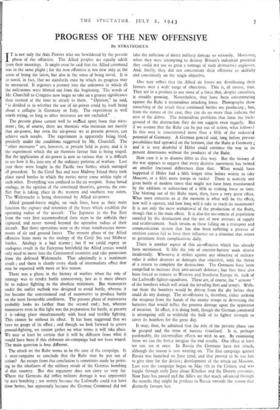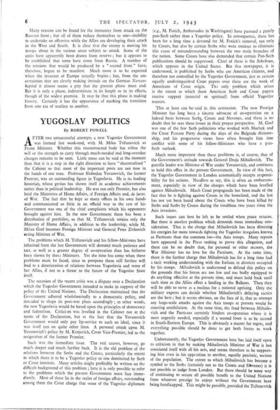PROGRESS OF THE NEW OFFENSIVE
By STRATEGICUS
IT is not only the Axis Powers who are bewildered by the present phase of the offensive. The Allied peoples are equally adrift
from their moorings. It might even be said that the Allied command was in the same plight ; for the new offensive is not new only in the sense of being the latest, but also in the sense of being noveL It is so novel, in fact, that no standards exist by which its progress may be measured. It registers a journey into the unknown in which all the milestones were blotted out from the beginning. The words of Mr. Churchill to Congress now begin to take on a greater significance than seemed at the time to attach to them. " Opinion," he said, " is divided as to whether the use of air-power could by itself bring about a collapse in Germany or Italy. The experiment is well worth trying, so long as other measures are not excluded." .
The present phase cannot well be stullied apart from that state- ment ; for, of. course, there are theorists who maintain not merely that air-power, but even the air-power we at present possess, can achieve such results. The experiment is apparently being tried, precisely under the conditions suggested by Mr. Churchill. The " other measures " are, however, at present held in petto, and it is the experiment which the air theorists favour that is being staged. But the application of air-power is now so various that it is difficult to see how it fits into any of the ordinary patterns of warfare. Last year there were fought in the Pacific two battles which outraged all precedent. In the Coral Sea and near Midway Island there took place naval battles in which the navies never came within sight of each other. Everything was confined to the air weapon. Some broad analogy, in the opinion of the convinced theorists, governs the con- flict that is taking place in the western and southern war zones. The Wehrmacht is being threatened by Allied air-power.
Allied ground-forces might, on such lines, have as their main function the capture and retention of the bases which establish the operating radius of the aircraft. The Japanese in the Far East from the very first accommodated their steps to the airfields they captured, and never moved beyond the operative radius of their aircraft. But those operations were in the main simultaneous move- ments of air and ground forces The present phase of the Allied offensive leans more to the analogy of the Coral Sea and Midway battles. Analogy is a bad master ; but if we could expect an analogous result in the European battlefield the Allied armies would only need to move into the Continental countries and take possession from the defeated Wehrmacht. That admittedly is a maximum result ; and there is clearly every shade of intermediate effect that may be expected with more or less reason.
There was a phase in the history of warfare when the role of strategy was to render battle unnecessary, just as it must always be to reduce fighting to the absolute minimum. But manoeuvre under the earlier outlook was designed to avoid battle, whereas it has became the conventional end of manoeuvre to produce battle on the most favourable conditions. The present phase of manoeuvre probably looks no farther than the second end ; but, whereas manoeuvre even in this light was the preparation for battle, at present it is .taking place simultaneously with hard and terrible fighting. This cannot be without its effect. It has been suggested that we have no gauge of its effect ; and though we look forward to severe ground-fighting, we cannot gather on what terms it will take place. We may at least be certain that it will be different from what it would have been if this elaborate air-campaign had not been waged. The main question is how different.
The attack on the Ruhr seems to be the core of the campaign. Is it over-sanguine to conclude that the Ruhr may be put out of action? An escape from this conclusion is sometimes made by point- ing to the dnallness of the military result of the German bombing of this country. But this argument does not carry . us very far. Where the Germans did inflict military damage it was apparently by area bombing ; not merely because the Luftwaffe could not have done better, but apparently becausethe German Command did not take the infliction of direct military damage so seriously. Moreover, when they were attempting to destroy Britain's industrial potential they could not use so great a tonnage of such destructive explosive. And, finally, they did not concentrate their offensive so skilfully and consistently on the single objective.
One may reflect that the Allied air forces are distributing their favours over a wide range of objectives. This is, of course, true. They are in a position to use more of a force that, despite casualties, is steadily growing. Nevertheless, they have been concentrating against the Ruhr •a tremendous attacking force. Photographs show something of the result these continued battles are producing ; but, from the nature of the case, they can do no more than indicate the area of the debris. The tremendous problems that form the back- ground of the destruction they do not suggest even vaguely. But if we assume that the Ruhr can be put out of action, what follows? In this area is concentrated more than a fifth of the industri4 potential of Germany. A German general said, long before present possibilities had appeared on the horizon, that the Ruhr is Germany ; and it is very doubtful if Hitler could continue the war in its present dimensions without the products of the Ruhr.
How easy it is to dismiss fifths in this way. But the history of the war appears to suggest that every decisive movement has turned on smaller fractional differences than that. What would have happened if Hider had a fifth longer time before winter to take Moscow, or a fifth more troops or tanks? There is scarcely any great battle of modern times that might not have been transformed by the addition or subtraction of a fifth in striking force or time. The blotting out of the Ruhr must, then, have a very great effect. What most concerns us at the moment is what will be the effect, how will it operate, and how long will it take to reach its maximum? It is not only the mere withdrawal of the production of the Ruhr, though that is the main effect. It is also the movement of population entailed by the destruction and the use of new avenues of supply and reinforcement. Such strains as these falling on a transport and communication system that has also been suffering a process of attrition cannot fail to have their influence on a situation that seems to germinate fresh complications daily.
There is another aspect of this air-offensive which has already been mentioned. It fills the role of counter-battery work almost incidentally. Whenever it strikes against any objective of military value it either destroys or damages that objective, with the threat of a return to complete the destruction. The Germans have been compelled to increase their anti-aircraft defence ; but they have also been forced to remove to Western and Southern Europe the bulk of the Luftwaffe fighter-squadrons. These are, of course, the " armour '' of the bombers which will attack the invading fleet and troops. With- out them the bombers would be driven from the sky before they could do any damage. The air-offensive is, therefore, either striking the weapons from the hands of the enemy troops or destroying the batteries that would inflict the greatest damage upon the apparatus of invasion. In effect, it is doing both, though the German command is attempting still to withhold the bulk of its fighter strength to cover its bombers for•the great day.
It may, then, be admitted that the role of the present phase can be grasped and the term of success visualised. It is, perhaps pardonably, the intermediate effects we wish to see. By examining them we can the better imagine the end results. One effect at least we can see at once. In Russia the Germans have not struck, although the season is now wearing on. The first campaign against Russia was launched on June 22nd, and that proved to be too late to give time for the decisive development of the attack on Moscow. Last year the campaign began on May 7th in the Crimea, and was fought through early June about Kharkov and the Donetz crossings. Now June has passed and the Allies are that much advanced through the months tha! might be perilous to Russia towards the season that distinctly favours her.
Many reasons can be found for the immunity from attack on the Russian front ; but all of them reduce themselves to one—inability to undertake an offensive while the Allies are developing their attack in the West and South. It is clear that the enemy is moving his troops about in the various areas subject to attack. Some of the units have apparently been drawn from reserve ; but it appears to be established that some have come from Russia. A number of the tensions that would be produced by a " second front " have, therefore, begun to be manifest. Much more is to be expected when the invasion of Europe actually begins ; but, from the un- certainties that are clearly making inroads on the German Nerven- kapital it almost seems a pity that the present phase must end. But it is only a phase, indeterminate in its length as in its effects, though of the widest promise. It may be that this phase is making history. Certainly it has the appearance of marking the transition from one era of warfare to another.



























 Previous page
Previous page